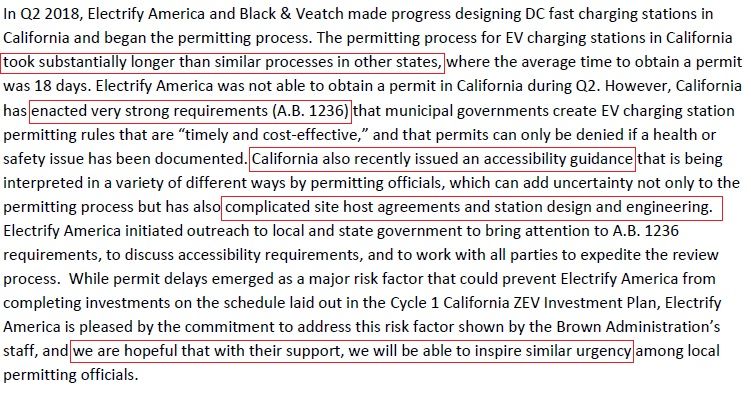We have seen some Tesla site in California also experience permitting delays. Having said that, Tesla has managed to build a very large number of Supercharger sites in the state using the same contractor.
Although the vast majority of those Tesla sites were presumably finished or under construction before these new California accessibility rules were announced.
Agree with others who have characterized the report as polishing the turd.
Which report was “polishing the turd”? That’s what SageBrush said about my report on the EA report.
While this certainly isn't a complete train wreck just yet, the engineer is definitely dozing off and the alarm clock is not looking to go off anytime soon.
They are obviously having their problems, particularly in California, however it’s worth noting that they never promised to have any DC highway sites finished and open until spring of next year. They did promise to have some community AC charging finished by now so that is technically that part that is most behind schedule.
My BS meter is off the scale, and I do not take EA's word for it that the CA bureaucracy is the main actor at fault. Heck, EA can just ~ copy/paste the Tesla submissions.
As others have noted, EA is using the same contractor that Tesla uses to design, get permits, and construct their California (any many other) site locations. This same contractor is already nearing completion on some locations in Oregon and may have built some of the locations already online elsewhere in the country.
There are some notable exceptions when comparing to Tesla, but one of the most glaring is the fact that they're spending money on advertising.
EA is required to spend money on advertising to promote EVs as part of the settlement with CARB (which reviewed their plans carefully and approved them).
1. Jeff annoys me. Unfair to tarnish EA with the same brush but his unfailing whitewashing of GM and GM related just rubs me the wrong way.
Glad to be of service to your curmudgeonly ways.

Your impression is yours to have. You may be annoyed when I correct false or misleading anti-GM claims or point out that the Bolt is an adequate long-distance vehicle when the proper charging infrastructure is available (I’ve driven ~1,000 miles over the last 2 days on my way to Canada).
I don’t think I’m a shill for GM. I reported way back in May, 2017 that the Bolt was limited to 55 kW:
Chevy Bolt EV Can Charge at 55 kW - HybridCars.com
I reported this year about some ongoing battery failure problems and two subsequent software “recall” notices. Other media like InsideEVs picked up and linked to my report:
New details emerge as a few Bolt EV packs continue to fail
2. Tesla is BY FAR the most important EV manufacturer; in fact more important than all the others combined. The political wrangling that excluded Tesla from benefitting from the VW settlement is plain wrong.
I assume you are referring to which plug designs and protocols are supported on the EA chargers.
Aside from the Tesla design not being part of any published standard, Tesla has not done anything to make their mechanical plug parts available to other companies. For example, the two Tesla to J1772 AC adapter designs on the market weren’t able to purchase official Tesla inlet parts and were forced to reverse engineer and design their own parts. I think Tony Williams was also unable to directly purchase Tesla plugs for use in another adapter. Tesla has also not published their non-standard Supercharger signaling protocol (it uses CANbus but is different than CHAdeMO). That may be why, independent of the Electrify America effort, none of the 5+ major independent DC charger vendors support Supercharging plugs on their products.
3. There is every indication that $2B is going to end up with very little to show for it.
It seems a tad premature to make that judgement at 1.5 years into a 10 year project. They have obviously spent much of that time hiring employees and contractors and making plans just like on any major nationwide infrastructure construction project. The fact is that the various DC charger vendors didn’t have production-quality equipment ready to ship prior to when the first EA stations were built early this year.
For the CCS/ChadeMO cars on the road that charge at rates from 22 to ~ 50 kW,
That works out to $0.29 at best and about $1 at worse per kwh
For a Bolt EV it works out to around $0.45 to $0.55 per kWh. This is roughly comparable to the non-subscription rates at EVgo chargers. EA has indicated they may roll out subscription plans with lower prices later this year or early next year. Right now they just take credit cards.
For cars that can charge at 100+ kW power similar to Tesla cars the EA rates work out to be roughly similar to Supercharger pay-as-you-go rates.
For the Bolt EV, today’s rates works out to be about the same cost as driving a typical gasoline car on a road trip so it’s not particularly punitive in that sense. I’m happy to pay it particularly until there is a larger competitive DC charging infrastructure built up.




